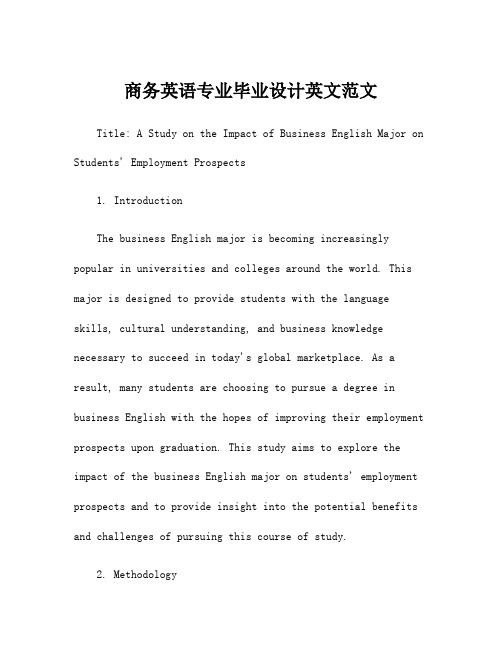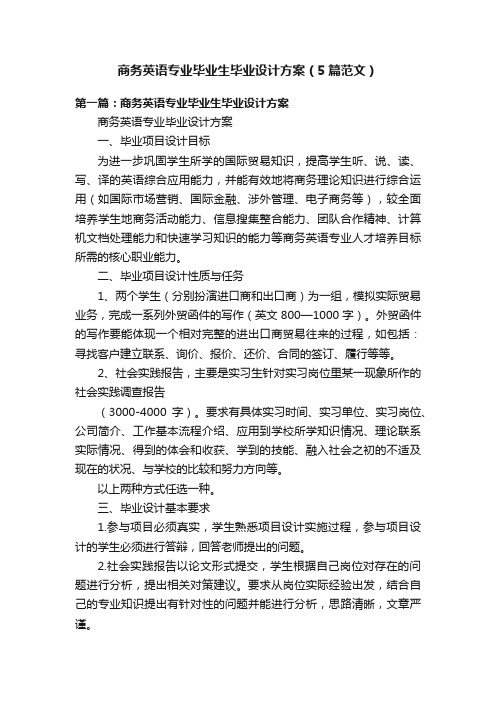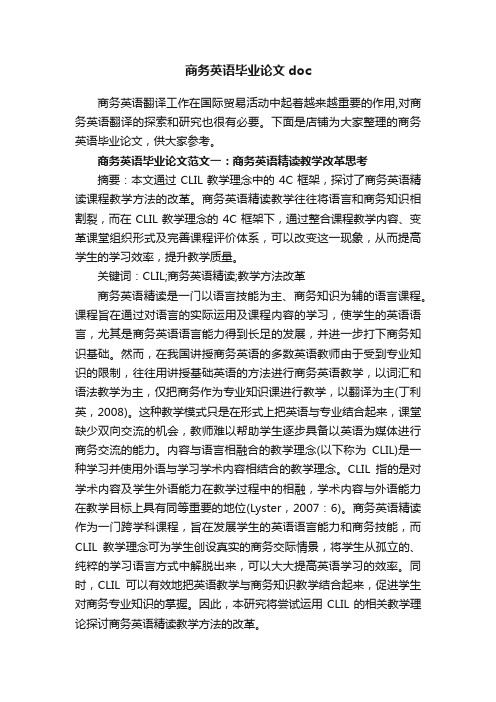商务英语毕业论文设计范文
商务英语专业毕业设计英文范文

商务英语专业毕业设计英文范文Title: A Study on the Impact of Business English Major on Students' Employment Prospects1. IntroductionThe business English major is becoming increasingly popular in universities and colleges around the world. This major is designed to provide students with the language skills, cultural understanding, and business knowledge necessary to succeed in today's global marketplace. As a result, many students are choosing to pursue a degree in business English with the hopes of improving their employment prospects upon graduation. This study aims to explore the impact of the business English major on students' employment prospects and to provide insight into the potential benefits and challenges of pursuing this course of study.2. MethodologyTo conduct this study, a survey will be distributed to current students enrolled in business English programs at a variety of universities and colleges. The survey will gather data on students' career goals, job search experiences, and perceived advantages and disadvantages of majoring in business English. Additionally, interviews will be conducted with recent graduates who majored in business English to gather more in-depth information about their post-graduation experiences and to explore how their major has influenced their career paths.3. ResultsThe results of the survey and interviews will be analyzed to identify common themes and patterns related to the impact of the business English major on students' employment prospects. This analysis will consider factors such as the perceived value of the major in the job market, the types of jobs and industries that students are able to enter, and theadvantages and challenges of pursuing a career with a business English degree.4. DiscussionThe findings of this study will shed light on the potential benefits and limitations of majoring in business English. It will also offer insights into how the skills and knowledge gained through a business English major can be leveraged in the job market. Additionally, this study will explore ways in which universities and colleges can better support business English students in their career development and job search efforts.5. ConclusionIn conclusion, this study will provide valuable information about the impact of majoring in business English on students' employment prospects. By understanding the experiences of current students and recent graduates, we can gain a better understanding of the value of the businessEnglish major and its potential to prepare students for success in the global marketplace.。
商务英语专业毕业生毕业设计方案(5篇范文)

商务英语专业毕业生毕业设计方案(5篇范文)第一篇:商务英语专业毕业生毕业设计方案商务英语专业毕业设计方案一、毕业项目设计目标为进一步巩固学生所学的国际贸易知识,提高学生听、说、读、写、译的英语综合应用能力,并能有效地将商务理论知识进行综合运用(如国际市场营销、国际金融、涉外管理、电子商务等),较全面培养学生地商务活动能力、信息搜集整合能力、团队合作精神、计算机文档处理能力和快速学习知识的能力等商务英语专业人才培养目标所需的核心职业能力。
二、毕业项目设计性质与任务1、两个学生(分别扮演进口商和出口商)为一组,模拟实际贸易业务,完成一系列外贸函件的写作(英文800—1000字)。
外贸函件的写作要能体现一个相对完整的进出口商贸易往来的过程,如包括:寻找客户建立联系、询价、报价、还价、合同的签订、履行等等。
2、社会实践报告,主要是实习生针对实习岗位里某一现象所作的社会实践调查报告(3000-4000字)。
要求有具体实习时间、实习单位、实习岗位、公司简介、工作基本流程介绍、应用到学校所学知识情况、理论联系实际情况、得到的体会和收获、学到的技能、融入社会之初的不适及现在的状况、与学校的比较和努力方向等。
以上两种方式任选一种。
三、毕业设计基本要求1.参与项目必须真实,学生熟悉项目设计实施过程,参与项目设计的学生必须进行答辩,回答老师提出的问题。
2.社会实践报告以论文形式提交,学生根据自己岗位对存在的问题进行分析,提出相关对策建议。
要求从岗位实际经验出发,结合自己的专业知识提出有针对性的问题并能进行分析,思路清晰,文章严谨。
3.格式统一。
四、毕业项目设计阶段步骤1.提交项目构架与调查报告题目:3月20日前2.提交毕业设计初稿: 5月15日前(电子文档交于指导老师。
)3.提交毕业设计正稿:6月10日前(一式两份,上交一份,自备一份)4.组织毕业项目设计答辩:时间待定五、毕业设计内容格式1.报告题目字数不宜超过20字,必要时可用副标题。
商务英语专业毕业论文范文精选

商务英语专业毕业论文范文精选随着全球经济一体化的发展,商务英语在当今社会日益重要,因此各高校都纷纷开设商务英语专业。
下面是店铺为大家整理的商务英语专业毕业论文,供大家参考。
商务英语专业毕业论文篇一:《商务英语写作能力培养思考》[摘要]商务英语写作能力是对外贸易活动中一项非常重要的能力,走访企业和问卷调查表明用人单位对商务英语专业毕业生的写作能力满意度并不高。
从校企合作模式角度来探讨如何更好地培养商务英语专业人才,以期为高校商务英语专业人才培养提供一定的借鉴意义。
[关键词]商务英语写作能力;人才培养模式;问卷调查及走访随着中国与世界各国的经济贸易往来日趋频繁,企业需要大量既掌握国际贸易商务知识与技能,又具有扎实的语言基本功和跨文化交际与沟通能力的复合型英语人才。
商务英语写作能力则成为国际贸易企业相互沟通、促进业务开展、顺利达成交易、建立友好合作关系等贸易活动的重要桥梁。
作为国际电子商务有效沟通的重要途径之一,商务英语写作能力在国际贸易中起着非常重要作用。
明确、清晰、积极、有人情味、有说服力电子商务邮件和沟通是有效的润滑剂,能够帮助克服文化障碍,是英语核心能力之一。
因此,商务英语写作能力对外贸从业人员尤为重要。
笔者以南京市100家中对外贸易企业作为研究对象,通过问卷调查和企业走访,发现目前的用人单位对新进人才的商务英语写作能力满意度并不高,本研究试图从校企合作视角探讨商务英语写作能力培养的有效模式。
一、现状及其问题商务英语写作能力包括一般贸易信函、贸易流程信函、商务社交信函、公司内部信函、及求职任职信函。
[1]89参考目前的本科及高职院校的商务英语专业人才培养方案以及一些学者的研究[2]34-41[3]30-34,问卷精选了与目前高校开设的商务英语课程内容相关度极高的8种商务写作知识与技能,下表是用人单位对这8种商务英语写作知识与技能满意度的评价。
表1企业对毕业生“商务写作知识与技能”的满意度(单位%)表1表明用人单位对商务英语专业从业人员的商务英语写作知识与能力的总体满意度不高,除了收发英文电子邮件以外,其他7种技能满意率都较低。
商务英语毕业论文doc

商务英语毕业论文doc商务英语翻译工作在国际贸易活动中起着越来越重要的作用,对商务英语翻译的探索和研究也很有必要。
下面是店铺为大家整理的商务英语毕业论文,供大家参考。
商务英语毕业论文范文一:商务英语精读教学改革思考摘要:本文通过CLIL教学理念中的4C框架,探讨了商务英语精读课程教学方法的改革。
商务英语精读教学往往将语言和商务知识相割裂,而在CLIL教学理念的4C框架下,通过整合课程教学内容、变革课堂组织形式及完善课程评价体系,可以改变这一现象,从而提高学生的学习效率,提升教学质量。
关键词:CLIL;商务英语精读;教学方法改革商务英语精读是一门以语言技能为主、商务知识为辅的语言课程。
课程旨在通过对语言的实际运用及课程内容的学习,使学生的英语语言,尤其是商务英语语言能力得到长足的发展,并进一步打下商务知识基础。
然而,在我国讲授商务英语的多数英语教师由于受到专业知识的限制,往往用讲授基础英语的方法进行商务英语教学,以词汇和语法教学为主,仅把商务作为专业知识课进行教学,以翻译为主(丁利英,2008)。
这种教学模式只是在形式上把英语与专业结合起来,课堂缺少双向交流的机会,教师难以帮助学生逐步具备以英语为媒体进行商务交流的能力。
内容与语言相融合的教学理念(以下称为CLIL)是一种学习并使用外语与学习学术内容相结合的教学理念。
CLIL指的是对学术内容及学生外语能力在教学过程中的相融,学术内容与外语能力在教学目标上具有同等重要的地位(Lyster,2007:6)。
商务英语精读作为一门跨学科课程,旨在发展学生的英语语言能力和商务技能,而CLIL教学理念可为学生创设真实的商务交际情景,将学生从孤立的、纯粹的学习语言方式中解脱出来,可以大大提高英语学习的效率。
同时,CLIL可以有效地把英语教学与商务知识教学结合起来,促进学生对商务专业知识的掌握。
因此,本研究将尝试运用CLIL的相关教学理论探讨商务英语精读教学方法的改革。
商务英语专业的毕业设计范文

商务英语专业的毕业设计范文In the realm of global business, the significance of effective intercultural communication cannot be overstated. Business English, as a specialized field, plays a pivotal role in bridging cultural divides and facilitating successful cross-border transactions. This paper delvesinto the nuances of intercultural communication in business English, with a focus on its application in cross-border negotiations.Firstly, it is essential to recognize that business communication is not merely about exchanging information but also about understanding and respecting cultural differences. In cross-border negotiations, parties often hail from diverse cultural backgrounds, each with its unique norms, values, and communication styles. These differences can either enhance or hinder the negotiation process, depending on how well the parties are able to adapt and respond to them.For instance, some cultures may prefer direct and assertive communication, while others may favor a more indirect and subtle approach. Understanding thesedifferences and adapting one's communication style accordingly is crucial for building trust and fostering a positive negotiation atmosphere.Moreover, the use of language in business English is highly specialized and often laden with cultural implications. Words and phrases that are commonplace in one culture may carry entirely different meanings in another. Therefore, it is imperative for business professionals to be aware of these nuances and to choose their words carefully to avoid misunderstandings or offense.To illustrate the importance of intercultural communication in business English, this paper presents a case study of a cross-border negotiation between a US-based company and a Chinese firm. The negotiation centered around a potential joint venture in the technology sector. Both parties had their own set of cultural norms and expectations, which significantly influenced the negotiation process.For example, the US company tended to be more direct and assertive in their approach, emphasizing efficiency and results. In contrast, the Chinese firm exhibited a morecautious and consensus-oriented style, valuingrelationship-building and long-term partnerships. These differences in communication styles initially caused some friction, but as the negotiation progressed, both parties learned to adapt and compromise.The US company recognized the importance of showing respect and patience, while the Chinese firm appreciated the Americans' focus on efficiency and results. Through a series of culturally sensitive exchanges, the two sides were able to bridge their differences and reach a mutually beneficial agreement.This case study highlights the crucial role of intercultural communication in business English,particularly in cross-border negotiations. It demonstrates that success in such negotiations often hinges on theability to understand and adapt to cultural differences, rather than simply relying on technical expertise or negotiation skills.In conclusion, business English professionals must possess a deep understanding of intercultural communication to excel in the global business environment. They must beable to navigate cultural nuances, adapt their communication styles, and use language effectively to build trust, foster understanding, and achieve successful outcomes in cross-border transactions.**商务英语中跨文化交流的重要性:以跨国谈判为例** 在全球商业领域,有效的跨文化交流的重要性不言而喻。
大学商务英语毕业论文

大学商务英语毕业论文商务英语是以国际间的商务往来为基础的语言交流,商务英语包括的范围比较广。
下文是店铺为大家整理的关于大学商务英语毕业论文的范文,欢迎大家阅读参考!大学商务英语毕业论文篇1浅论商务英语翻译的技巧商务英语所涉及的范围比较广泛,涉及各行各业,这也就决定了从事商务英语翻译的人不仅仅需要有扎实的英语基本功,还有对其他方面的英语进行了解,这样一来才能使交易双方能够更好地沟通,完成交易。
现如今,整个世界融为了一个整体,各个国家之间的贸易往来逐渐丰富,目前在国际间最通用的就是英语。
商务英语要求翻译者更加的精确、对等,因为商务英语中会涉及到很多文件、条款等信息,所以必须要精确。
只有这样才能达到双方活动的顺利进行。
尤其在我国,中西方文化差异较大,更应该注意这方面的问题。
一字之差就容易铸成大错。
所以,做好商务英语的翻译工作尤为重要。
本文针对这一问题展开讨论,分析了商务英语的翻译技巧。
1. 商务英语及商务英语翻译的概括商务英语涉及范围很广,包括的种类也十分多。
大部分跟国际商务活动有关的例如:国际贸易、会计、金融等方面所用到的英语都属于商务英语的范围。
它涉及的领域主要包括对外贸易、招商引资、国际旅游、海外投资以及国际运输等方面。
除了领域广泛之外,它还包括许多专业的英语例如:广告英语、法律英语、应用文英语、包装英语等。
因此,伴随着国际贸易的范围不断的扩大,越来越多的人,开始加入到翻译的这一事业之中。
对商务英语的翻译,在很长时间以来备受关注,商务英语翻译工作也是一项十分复杂的工作,由于其用途的广泛性和特殊要性,就决定了商务英语的翻译工作不能仅仅局限于传统的翻译中务词汇和具有较好的商务语法基础,这些是一个翻译者应该具备的原则和技巧,不能仅仅依靠“信、达、雅”的翻译要求来完成商务英语的翻译工作,必须依照商务文件的愿意,把它翻译的既能清楚的表达意义,又能够符合商务双方的语言习惯。
在翻译的过程中一定要从实际情况出发,做到具体问题具体分析。
商务英语专业毕业论文(最新5篇)-最新
商务英语专业毕业论文(最新5篇)商务英语专业要求学生受到英语听、说、读、写、译等方面的良好训练,掌握英语语言和文学、政治、经济、管理、社会文化等方面的基本理论和基本知识,并通过英语专业全国四级和八级考试。
下面是精心为大家整理的5篇《商务英语专业毕业论文》,希望能够给您提供一些帮助。
商务英语教育改进措施篇一1、改进教学内容。
在语言经济学视角下,加强对课程设置的改革,可以提升商务英语的教育质量,并且可以提升商务英语的语言价值。
在目前的商务英语教学中,主要以基础、知识和能力为主要教学目标,难以满足社会的发展形式,同时不利于学生在社会的发展。
另外,商务英语的教学目标主要是便于学生和供应商的谈判,然而在实际教学中,学生通过实践课程难以有效的提升自身的专业素养。
因此,我国商务英语教育应该适当的改革教育内容,以期可以更好的促进学生的发展。
首先,商务英语的教学应该以基础知识为主要目标,要使学生具备扎实的基本功底。
其次,我国商务英语院校要提升学生的听说和翻译技能,使其可以更好的同外国客户进行交谈,从而可以提升学生的业务能力。
最后,我国商务英语教学中,应该设立一部分实践性内容,以期可以帮助学生掌握最新的岗位工作流程,进而可以为社会提供更多的实用型人才。
2、以社会需求为教育导向。
在商务英语的教学中,主要是以基础教学和交流为主,学生难以掌握企业的最新发展形式,不利于企业更好的融入社会的发展。
针对这种现象,我国商务英语院校应该积极的制定相应的措施,以期可以提升学生的适应能力。
首先,我国商务英语院校应该积极的在教学过程中添加应用实例,例如企业的最新发展动态和客户的最新谈判技巧等,只有在课程教育中添加实践性内容,才可以更好的提升学生的素质。
其次,我国商务英语院校应该加强对学生的实践技能训练,学校可以根据自身的经济条件,建立适当的实训基地,以期可以增加学生的课后实践,从而可以更好的使学生将理论与实践相结合。
最后,我国商务英语院校可以加强和社会企业的合作,将学生输送到企业中进行实习,这种方式不但可以提升学生的实践性能力,还可以提升学校的教学质量。
商务英语专业类毕业论文范文
商务英语专业类毕业论文范文一、跨文化交际视角下的商务英语沟通策略研究摘要:随着全球化的深入发展,跨文化交际在商务活动中变得越来越重要。
本文以跨文化交际理论为基础,探讨了商务英语沟通策略在跨文化商务环境中的应用。
通过对相关文献的综述和实际案例的分析,本文提出了跨文化商务沟通的策略,包括文化意识培养、语言能力提升、非语言沟通技巧等。
研究发现,有效的跨文化商务沟通能够促进商务合作的顺利进行,提升企业的国际竞争力。
关键词:跨文化交际;商务英语;沟通策略;全球化;商务合作二、商务英语翻译中的文化因素及其应对策略研究摘要:商务英语翻译是跨文化商务活动中的重要环节。
本文以文化因素对商务英语翻译的影响为切入点,探讨了商务英语翻译中的文化差异及其应对策略。
通过对实际翻译案例的分析,本文提出了在商务英语翻译中处理文化因素的策略,包括文化背景了解、语言转换技巧、文化适应能力等。
研究发现,有效的文化因素处理能够提高商务英语翻译的准确性和可接受度,促进跨文化商务交流的顺利进行。
关键词:商务英语翻译;文化因素;应对策略;跨文化商务交流三、商务英语口语教学中的情境模拟与角色扮演研究摘要:商务英语口语教学是培养商务英语专业学生实践能力的重要途径。
本文以情境模拟和角色扮演为教学方法,探讨了商务英语口语教学的有效性。
通过对教学实验和数据分析,本文发现情境模拟和角色扮演能够激发学生的学习兴趣,提高口语表达的流利度和准确性。
同时,本文还提出了在商务英语口语教学中应用情境模拟和角色扮演的具体方法和注意事项。
关键词:商务英语口语教学;情境模拟;角色扮演;实践能力;教学方法四、商务英语专业课程设置与就业需求对接研究摘要:商务英语专业的课程设置需要与就业需求相匹配,以提升学生的就业竞争力。
本文以我国某高校商务英语专业为例,通过调查分析企业对商务英语专业毕业生的需求,提出了优化课程设置的建议。
研究发现,企业对商务英语专业毕业生的语言能力、跨文化交际能力、商务知识等方面有较高要求。
商务英语专业的毕业设计范文
商务英语专业的毕业设计范文In the rapidly evolving landscape of global business, the importance of communication skills cannot be overstated. My graduation project aims to bridge the gap between theoretical knowledge and practical application in the field of Business English.The core of my research is to evaluate the effectiveness of various communication strategies in cross-cultural business environments. Through case studies and surveys, I will explore how language nuances affect business outcomes.A significant aspect of my project will be the development of a comprehensive glossary of business jargon, tailored to facilitate clearer understanding among international business partners. This glossary will be avital tool for students and professionals alike.Moreover, I will delve into the impact of digital communication tools on business transactions. The rise of social media and instant messaging platforms has transformed how we conduct business, and my project will analyze their pros and cons.Another critical component of my work will be the examination of non-verbal communication in business settings. Body language, facial expressions, and tone of voice play a pivotal role in conveying confidence and sincerity.I will also address the challenges faced by English as a Second Language (ESL) speakers in the business world. Strategies for overcoming language barriers and improving fluency will be explored, with a focus on practical exercises and real-world scenarios.Furthermore, my project will provide insights into the role of ethics in business communication. Trust and integrity are foundational to any successful business relationship, and understanding the ethical dimensions of language use is essential.Lastly, I will synthesize my findings into a set of best practices for effective business communication. These guidelines will serve as a roadmap for navigating the complexities of the global marketplace.Through this comprehensive approach, my graduationproject seeks to equip future business professionals with the skills necessary to excel in an increasingly interconnected world.。
商务英语类毕业论文
商务英语类毕业论文范文一:商务英语阅读教学论文1建构主义理论(1)学习者建构他们自己的学习;(2)新的学习依赖于学生已有的理解;(3)社会互动起着至关重要的作用;(4)需要真实的学习任务确保有意义的学习。
课堂变成的一个小型社会,学习者们联合起来参与活动,讨论和反馈。
教师的作用是促进和指导,而不是命令。
自主学习,社会关系的互惠互利和教师授权是建构主义课堂的特色。
学习者能够深入理解教学,理解知识建构的本质,以及建构复杂认知地图把知识体系与他们的理解认知连接起来。
认知建构主义主张使用三种方法来提高改善学习者的自主学习:首先,直接传授。
直接传授给学习者有关学习和学习策略的知识,帮助学习者建构他们自己的学习理论,补充改进他们不完善不正确的自主学习理论。
第二,使用同侪指导和学习。
和同学讨论能够帮助学习者建构他们自己的自主学习理论。
第三,倡导合作学习。
在合作学习的过程中,学习者能够交流学习经验,丰富自己的自主学习理论。
2商务英语阅读教学存在的一些问题2.1高职学生英语基础薄弱随着最近几年我国高职院校的不断扩招,而生源数量在逐年下降。
因此,大多数高职院校的录取分数呈现出一种下降的态势,尤其是英语的分数下降的更为明显。
大部分商务英语专业的学生英语基础都很薄弱,基本的听说读写技能都未过关。
由于商务英语的专业性较强,涉及领域特别广泛,体裁灵活,专业词汇多,阅读中长句难度特别多,学生初次接触商务英语阅读,一片茫然,无从下手,更谈不上积极性和主动性了。
2.2专业师资整体素质不高担任商务英语阅读课的教师大部分都是语言专业出身,他们英语水平较高,听说读写译的能力较强,掌握了一些英语教学方法。
但是,大部分教师缺乏对商务知识全面地系统地学习掌握,他们对商务知识的学习一般都是碎片式的。
在商务英语阅读教学时,很多都是现学现教,许多教师都缺乏企业一线的经历。
商务英语阅读的师资素质导致了商务英语阅读的教学效果不是很理想。
2.3课堂教学以教师为中心目前,我国大部分商务英语阅读课堂教学中,课堂活动仍以教师为中心,教师是课堂活动的组织者,采用的教学方法还是以语法翻译为主,试图将大量的信息灌输到学生头脑当中。
- 1、下载文档前请自行甄别文档内容的完整性,平台不提供额外的编辑、内容补充、找答案等附加服务。
- 2、"仅部分预览"的文档,不可在线预览部分如存在完整性等问题,可反馈申请退款(可完整预览的文档不适用该条件!)。
- 3、如文档侵犯您的权益,请联系客服反馈,我们会尽快为您处理(人工客服工作时间:9:00-18:30)。
学号:20125061824商务英语写作论文学院:外国语学院专业:商务英语年级: 2 0 1 2 级姓名:胜男论文题目:Implication of Cultural Differences on International Business Negotiations 指导教师:晶漪职称:副教授成绩:2014 年 6 月 19 日ContentsAbstract. (3)Key words (3)摘要 (3)关键词 (4)1.Introduction (4)2. Types of Culture Differences (4)2.1 Value View (4)2.2. Negotiating Style (5)2.3. Thinking Model (5)3. Impact of Cultural Differences on International Business Negotiations 53.1Impact of Value Views Differences on International Business Negotiations 63.2 Impact of Negotiating Style Differences on International BusinessNegotiations (6)3.3 Impact of Thinking Model Differences on International BusinessNegotiation (7)4. Coping Strategy of Negotiating across Cultures (7)4.1 Making Preparations before Negotiation. (8)4.2 Overcoming Cultural Prejudice (8)4.3 Conquering Communication Barriers (8)5. Conclusion (9)Bibliography (10)Implication of Cultural Differences on International BusinessNegotiationsName: Zhang Shengnan No.:Business English Major School of Foreign LanguagesSupervisor: Li jingyi Title: Associate Professor Abstract: The business negotiations under different cultural conditions come to cross- cultural negotiations. With the economic globalization and the frequent business contacts, cultural differences seem to be very important; otherwise they could cause unnecessary misunderstanding, even affect the result of the business negotiations. This means it is very important to know the different culture in different countries and the ways to avoid the culture conflicts in the international business negotiations. The article commences from the types of culture differences, then it explains the impacts of these culture differences on international business negotiation and finally it analyzes how to deal with the problem of the cultural differences correctly in negotiation process. Such a standpoint is emphasized: In the business negotiations between different countries, negotiators should accept the other party’s culture, and try to make him be accepted; then make a correct evaluation with the help of valid communication and discover their real benefits between them. Besides, we should know clearly and try to accept the culture differences as possible as we can. It is very important for the success of culture negotiations.Key words: Culture; Cultural differences; Business negotiation; Impact摘要:不同文化条件下的商务谈判就是跨文化谈判。
在世界经济日趋全球化的今天,随着国际间商务交往活动的频繁和密切,各国间的文化差异就显得格外的重要,否则将会引起不必要的误会,甚至可能直接影响商务交往的实际效果。
这味着如何化解各国不同文化背景在国际商务谈判中是非常重要的。
文章从文化差异的类型入手,然后解释了这些文化差异对国际商务谈判的影响,最后分析了如何正确解决谈判过程中文化差异的问题。
文章强调了这样一个观点,在不同国家商务谈判中,谈判员应该接受对方的文化,并试图是自己被对方所接受,然后在有效沟通的帮助下做出正确评估,并找出它们之间的真正利益。
此外,们应该尽可能的清楚的了解并发现对方的文化。
这对文化谈判的成功至关重要。
关键词:文化;文化差异;商务谈判;影响1.IntroductionAlong with the advancement globalization and China’s WTO entry, business enterprises in China have to face more and more business negotiations with foreign enterprises, especially with American enterprises. In these negotiations, Chinese negotiators sometimes feel uncomfortable, puzzled, lost, irritated and the alike, because of unfamiliar custom and behaviors demonstrated by American negotiators. Meanwhile, American negotiators confront the same situation. Cult rural differences between China and west countries could cause many problems. Therefore, understanding cultural differences and overcoming them is crucial in international business negotiations.Although the definition of culture is numerous and vague, it is commonly Recognized that culture is a shared system of symbols, beliefs, values, attitudes and expectations. Culture is a major determinant in business negotiation. So have a clear picture of culture differences if of great significance.2. Types of Culture DifferencesThe east countries and west countries have produced different cultures on the different continents. Among the different cultures, value views, negotiating style and thinking model appear more obvious.2.1 Value ViewValue view is the standard that people use to asses objective things. It includes time view, equality view and objectivity. People may draw a different or even contradictory conclusion about the same thing. Value view is one of the mostimportant differences among the many factors. It can influence the attitude, needs and behavior of people. The value view varies from nation to nation, people know that the eastern person focus on collectivism, while the western people pay more attention to individualism.2.2. Negotiating StyleNegotiating style refers to the tolerance and graces which the negotiator shows in the negotiation. The negotiators show their negotiating style through behavio r, manners and the method of controlling negotiation process during the negotiation. The negotiator’s negotiating style has a bearing on their culture background. According to the culture differences, negotiating style falls into two types: the east negotiating style pattern and the west negotiating style pattern.2.3. Thinking ModelThinking model reflects the culture. Because of the influences of history background, continents, words and living method, different nations generate different thinking models. Surely, there is more than one thinking model of a nation, but one is more obvious compared with others. As a whole, east people, especially Chinese have strong comprehensive thinking, image thinking and curved thinking, while analytical thinking, abstract thinking and direct thinking are possessed by the west people.3. Impact of Cultural Differences on International Business NegotiationsWith the rapid development of economy, we need to do business with businessmen under different culture background, so in order to reach trade agreement, it is necessary for us to study the impact of culture differences on international negotiation in global business activities. The impact of culture differences on international negotiation is extensive and deeply. Different cultures divide the people into different group and they are also the obstacles of people’s communication. Accordingly, it is required that the negotiator should accept the culture of each other. Furthermore, through culture differences, it is important that the negotiator reveal andunderstand the other party’s goal and behavior and make him or herself be accepted by the opponent to reach agreement finally.3.1Impact of Value Views Differences on International Business NegotiationsValue Views Differences on International Business Negotiations fall into three types: time view, negotiation style, thinking model. Each has big influences on business negotiationThe objectivity in international business negotiation reflects the degree to which people treat any things. West people especially Americans have a strong objectivity on the understanding of issues. At negotiation table, Americans don’t care much about relationship between people. They don’t care if the status of the opponent is equal to theirs. They make decision based on facts and data, not people. The saying that public things use public ways is a reflection of American objectivity. Therefore,Americans emphasize that Businessmen should distinguish people and issues, what they are really interested in is the actual problems. But in the other parts of the world, it is impossible for them to distinguish people and issues.3.2 Impact of Negotiating Style Differences on International Business NegotiationsThe impacts of negotiating style differences on international business negotiation mainly exist in negotiating method and negotiating structure. Take the negotiation between America and China as a example, since the oriental care more about unity in thinking, they method they adopt in negotiation is from unity to parts, from the big to little, from the abstract to the concrete, that is to say they should each agreement on general terms, then begin to talk about the concrete terms. And usually not until the end of the negotiation do they make compromise and promise based on all the items, and then to reach agreement. The west people are influenced by analytic thinking, so pay more attention to logical relations between things. They consider more about concrete things than integrity. And they tend discuss the concrete items at the beginning of negotiation, so they often resolve the price, delivery and issuance respectively at first. And they may make compromise at every detail, so the final contract is the combination of many little agreements. The negotiating structure islinked with cultures. Negotiating structure mostly refers to the number of the participants. In business negotiation, the foreign delegation is usually composed by 3-5 people, while the Chinese one could be more 15 people. That results from the influence of collectivism. So they often said to their partners: Let us think about it. Let us discuss it. But the west negotiators could make the final decision without going back for discussion. That because their admire individualism and hard working. They have strong independence. They would carry on according to the best ways after knowing their goals. What’s more, most west people think that they have the ability to deal with the negotiation situation on their own. And truly, they are brave enough to take responsibility.3.3 Impact of Thinking Model Differences on International Business NegotiationThe thinking model of Chinese tends to be comprehensive, concrete and curved, while the Americans are usually analytic, abstract and straight-line. We Chinese are accustomed to talking about general principles at first and then move onto details. To Chinese negotiators, the core is the general guideline, and the details are subject to the guideline. After figuring out the big picture, other problems are easier to resolve. It is the most obvious feature of Chinese negotiators. But west businessmen, especially Americans are likely to discuss the details first and try to avoid the principle. They value details very much and think noting about the unity. Accordingly, they want to discuss the details at the beginning of negotiation. They are direct and simple in negotiation. As a matter of fact, many facts show that General principles first have impact of constriction on the parts and details. For instance, our government insists on the principle that Hong Kong and Macao are undivided parts of China’s territory. In the important diplomatic negotiations such as Entering into relationship with America, Hong Kong’s and Macao’s Coming back into their motherland. It is under such principle that we established the tone of the negotiation and controlled the skeleton of the negotiation, thus we get the advantage and prompt the success of negotiation.4. Coping Strategy of Negotiating across CulturesThe culture differences in cross-cultural communication have various impacts on operation of enterprises. These differences will influence negotiation and management of transnational operat ion; what’s more, it may have bad effects on the harmonious relationship between our country and foreign countries. Maybe that will lead to the missing of market opportunities, the increase of trade cost and the low efficiency of company management. So, it is really necessary for us all to eliminate and avoid disadvantageous effects.4.1 Making Preparations before Negotiation.The negotiators must make good preparations if they want control the development of negotiation successfully in the complex situation. Only do they make good preparations can they make changes freely according to the situation of negotiation and avoid the happening of conflicts. Because the international business negotiation involves extensive aspects, more preparations are needed. The preparations often include the analysis of the negotiators themselves and the opponents; the constitution of negotiation group, elaborating the negotiating goal and strategy and going on imitation negotiation when necessary. When making preparations, you should try to know the opponents while you analyze yourselves. Analyzing yourselves mainly refers to studying if the project is feasible. To knowing about the opponents means understanding their strength such as credit status, the policy、business customs and regulations of their countries and theconditions of their negotiating members and so on.4.2 Overcoming Cultural PrejudiceTolerating different cultures and overcoming cultural prejudice contribute to better communicating with each other and understanding each other. West people often think that they are powerful, capable and experienced, so sometimes, we need to recognize then and give then some good comments. We should learn about the foreign cultures before negotiation and accept and understand their cultures in negotiation, because every country regard their own cultures as a matter of course and hope that their culture could be recognized and accepted.4.3 Conquering Communication BarriersTwo trains running at different railways in the opposite direction will collide with each other; maybe this is the best arrangement for trains. But to communication between people, there won’t be communications if people go ahead according to their own ways. Trains will collide with each other if they run on the same railway at the opposite direction. But if we measure by the objective of people’s communication, only we meet each other, can we have communication and friendship. In negotiation, sometimes we can’t make much progress although we have talked for long time. And sometimes both parties are not satisfied. After thinking, that is caused by communication barriers which happen easily in cross-cultural negotiation. We should make sure if there appear communication barriers, if so, we must overcome them. Generally speaking, we should pay more attention to the following three communication barriers in cross-cultural negotiation: the communication barriers caused by culture background of both; the ones caused by misunderstanding of the contents and information from the partner; the ones caused by not being willing to accept the opponent’s contents and ideas.5. Conclusion“Social Customs varies in different countries”. In a word, cross- cultural communication will meet the problem of culture differences surely. In turn, culture differences also influence all aspects of international business communication. To avoid or to resolve the culture differences is a huge task in international business negotiation. In order to step into the international market successfully, we must have the awareness of culture differences, acknowledge culture differences and understand different cultures. Try to know yourself and know them. What’s more, we should respect different behavior of businessmen under different culture background, and then we could reduce unnecessary conflicts resulting from not respecting the opponents. It is beneficial for both to form an atmosphere of mutual trust and cooperation, reduce culture differences and turn disadvantages into advantages and benefits. Thus, we could avoid conflicts and obstacles, then to promotecommunication and harmony in international business negotiation.Bibliography[1]Cao Ling editor: "Business English negotiations," Foreign Language Teaching andResearch Press, 2004[2]Catherine, kelly, reardon. Negotiation power. Beijing: contemporary Chinapublishing house, 2005[3]Gao Jianjun BianJiLan. Business negotiation practice. Beijing: Beijing universityof aeronautics and astronautics press, 2007[4]Lu Run. Business negotiations. Chongqing: chongqing university press, 2003[5]Qiu Gejia,Yang Guojun editor: "win-win negotiations of modern businessEnglish", China International Radio Press, 2006[6]Rhode. Negotiations never-say-die. Hangzhou: zhejiang university press, 2003[7]Steve Cohen. Managers negotiation techniques. Haikou: hainan publishing house,2003[8]Wang Furong. Compromise. Beijing: China textile press, 2005[9]Weng Fengxiang edited: "An Introduction to International Business", TsinghuaUniversity Press / Beijing Jiao tong University Press, 2006[10]Xie Xiaoying editor: "Business English negotiations", China Business Press.。
